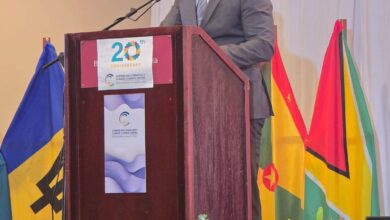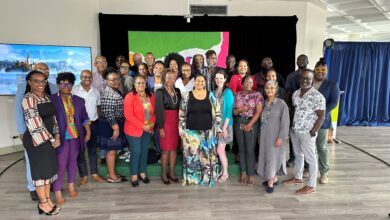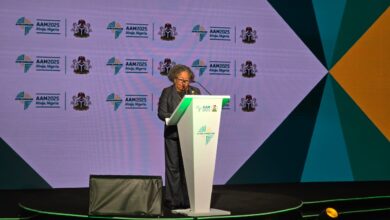Master of Ceremonies
His Excellency, Sir Cuthbert Sebastian, Governor General of St. Kitts and Nevis
His Excellency, Edwin W Carrington- Secretary-General of CARICOM
Hon. Dr. Denzil Douglas, Prime Minister of St. Kitts and Nevis and Chairman of the 27th CARICOM Heads of Government Conference
Hon. Patrick Manning, Prime Minister of Trinidad and Tobago and outgoing Chairman of the Conference
Colleague Prime Ministers and Heads
His Excellency Don McKinnon, Secretary-General of the Commonwealth
Members of the Diplomatic and Consular Corps
Regional delegations
Distinguished ladies and gentlemen, and peoples of the Caribbean
Let me first say how pleased I am to be in the beautiful islands of St. Kitts and Nevis.
May I thank my host prime minister, the Hon Dr. Denzil Douglas for the warm hospitality extended to the delegation of Jamaica.
It is for me a signal honour to be addressing this distinguished gathering of colleague Heads of the Caribbean Community on the occasion of its 27th Heads of Government Conference.
You will permit me if I pause to reflect on the fact that I am the only woman among the Heads at this Conference! And, the first female Prime Minister from Jamaica. I hope my presence will serve as an inspiration for others.
As I take my place among you, I want to reassure you, my colleagues, that my government will continue the fine and exemplary tradition of regional cooperation fostered by such stalwarts as Michael Manley and P.J. Patterson.
I am particularly pleased that I can stand alongside my colleague Heads to welcome the return of our sister Member State, Haiti, into the Councils of CARICOM. I extend a very special and warm greeting to His Excellency René Préval, the new democratically elected president of the Republic of Haiti.
Mr. President, the return of Haiti has restored CARICOM to its full strength and has served to reaffirm that the democratic traditions of the Caribbean remain entrenched in the political fabric of our Community.
We must now look ahead to a future with Haiti taking its rightful place in CARICOM. We look forward to the day when Haiti will become a full participant in the CARICOM Single Market and Economy (CSME).
The Government of Jamaica stands ready to work with the Haitian Government in identifying areas in which we could strengthen our assistance.
Mr. Chairman, I am aware that our movement has often been criticised for not advancing at a faster pace, but we only have to look around us. Despite our small size and limited capacity, CARICOM remains the longest surviving integration movement in this corner of the globe, and certainly among developing countries.
Our efforts in functional cooperation and collaboration in a number of areas including education, agriculture, tourism, crime and security concerns, as well as our ability to come together as a cohesive force do count for much and is one of the hallmarks of our success.
It goes without saying that the natural focus of a discussion on Caribbean integration at this time must be on the CSME. The CSME marks the culmination of a process which began 17 years ago. It was based on the conviction that CARICOM needed to deepen the process of integration in order to position itself to meet the challenges of an increasingly liberalised global economy.
A key element in its implementation is the creation of a Development Fund for Disadvantaged countries, regions and sectors, and Jamaica welcomes the ongoing work in this regard. Allied to this, we must continue to work with resolve towards the launch of the Single Economy by 2008, which will be built on the framework established by the Single Market.
But there is need to put in place the necessary legal and institutional framework to give full effect to the Single Economy, as it will involve greater levels of integration. The Single Economy cannot be built by state action alone. It has to come from the imagination of all entities in the Caribbean. Critical thinkers, along with the private sector must be involved in its planning and implementation.
Above all, the people throughout the Region must be engaged in the process, including the need to intensify the public education programme to foster greater understanding, involvement and support.
Mr. Chairman, we find our Region operating in a time of great possibilities. But, even at this exciting time, we are confronted by a number of challenges to our regional integration movement. This year has been an extremely hectic one for CARICOM trade negotiators, with every indication that the pace and demands of the negotiations will only intensify in the coming months. We must face this reality with a clear sense of purpose. As small, vulnerable economies, we must remain true to the sacrifices of our forebearers and actively play our part in shaping our future.
In doing so, we must determine that the legacy we bequeath to future generations in CARICOM should not condemn them to an existence on the margins, where the legitimate aspirations for economic and social development that guarantees our citizens a decent life, would remain an illusion. As a consequence, any agreement that we sign at the bilateral, hemispheric or multilateral level must support and contribute to the realisation of our broad development objectives and the enhancement of the welfare of our peoples from all walks of life.
Mr. Chairman, Jamaica has always emphasised the fact that one cannot speak of trade without speaking of development – there is an intrinsic link between the two. For what, I ask, is the purpose of increasing trade, if it is not to secure a sustainable basis for economic growth, social development and advancement of our peoples?
In my view, one complements the other and they cannot be pursued as separate issues. The issue of poverty must be high on our agenda of concerns. After all, the purpose of economic growth must be to reduce poverty and inequality in our Region.
To make regionalism real to our people, they must see that our deliberations and our decisions have everything to do with improving their standards of living and reducing the poverty rate in our various countries.
We must never forget that people are the object of development. I am reminded of the words of Marcus Garvey: “Poverty is a hellish state to be in. It is no virtue. It is a crime. To be poor is to be a fit subject for crime and hell.”
We must pay attention to meeting the UN Millennium Development Goals (MDGs). I would like to see us, Mr. Chairman, make a more direct attack on poverty. I would like to see us measure our progress not only by GDP growth in itself, or the rate of the growth of expansion in exports, attraction of foreign direct investments or the building up of the net international reserves, though these are important and necessary.
Let us judge ourselves by the rate at which we are reducing poverty and raising the standards of living of the mass of the Caribbean people.
Mr. Chairman, against this background, the work of the Council for Human and Social Development is increasingly important.
- We must focus on the strengthening of our human resources through education and capacity building.
- We must devote the requisite resources to deal with the HIV/AIDS pandemic that is ravaging the Region and which has implications for our development.
- We must ensure that opportunities exist for the youth of the Region to participate in social, cultural, political and economic development.
- We must ensure that our citizens have access to a decent standard of living and employment opportunities.
- We must ensure that there are no divisions driven by gender perceptions that will serve to disadvantage women in political or economic activities or in whatever field they choose to pursue.
- It is also of critical importance that we foster a viable Region-wide programme for the development of sports and culture.
I know you are all aware that a son of Jamaica, a citizen of the Region, who trains in Jamaica, is the fastest man in the world.
Likewise let me congratulate Trinidad and Tobago, the smallest country to have ever qualified for the world cup, for the outstanding performance of the Soca Warriors that made all of us in the Region very proud.
We have a vast, untapped potential and we must find ways to harness and channel it in a manner that will reap greater benefits for our Region.
Mr Chairman, the agenda before us is formidable and these three days of deliberations must place us on a more secure path to meet the challenges ahead.
One area in which I would personally like to see us make some progress is in the area of governance. The proposals emanating from the Rose Hall Declaration remain relevant and we must pool our collective energies in deciding the way forward. Strengthening the governance structures in the community is crucial to the success of our integration movement.
As a Region, we have long realised the extent of talents, skills and expertise that reside within the Caribbean Diaspora. What we must now begin to do, Mr Chairman, is pay greater attention to the contribution and potential impact of the Diaspora on the development of our countries.
It is therefore timely, that the matter of migration will be discussed at this 27th Conference, in preparation for the UN High-level dialogue on migration and development in a few months time.
I urge all of us to recommit ourselves to the cause of justice for all and in particular, the poor and dispossessed. Let whatever we do, whatever decisions we take, be done to bring about an enhancement in the welfare of our people.
Our mandate as leaders is set out in Isaiah 58:
“Loose the chains of injustice
And untie the cords of the yoke
Set the oppressed free
And break every yokeShare your food with the hungry
Provide the poor wanderer, the shelter
When you see the naked, clothe him
And do not turn away from your own flesh and blood”
And so, we move forward in confidence, confronting the challenges and taking advantage of the opportunities, knowing that full Caribbean regionalism is attainable.
I leave with you the words of Jamaican poet, H.D. Carberry:
“It takes a mighty fire to create a great people It takes a mighty fire to smelt true steel To create and temper steel needs Patience and endurance But oh! What steel and what people are my people.
The mould is not yet made, perhaps, that can unite and make my people one. But more important than the mould, is the temper of the steel; the spirit of my people.
There is a vitality, a quality of living that knows no equal It is difficult steel to smelt; they are crude and simple, dark and deep. But oh! What steel and what a people are my people.
And when that steel is smelted, and when that steel is tempered, and when that steel is cast Oh! What a people shall my people be! “
I thank you for your warm welcome. May God bless Our People. One Caribbean. One Region. One love!





